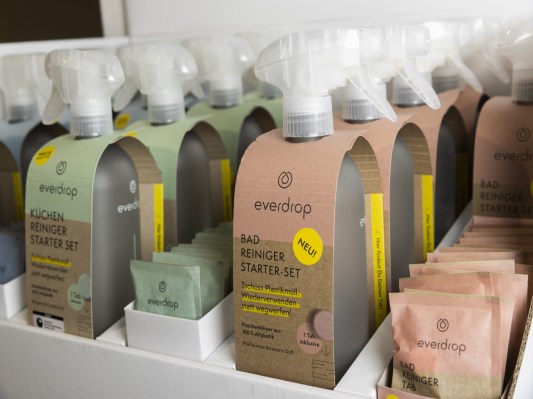Household cleaning chemicals in the form of a tablet that can be dissolved in water appear to have given rise to a number of startups. As well as Munich-based startup everdrop, there is also Atmo Home out of Berlin, as well as Grove Collaborative, Blueland, Smol, Spruce, Ocean Saver … the list goes on. Few, however, have managed to scale as fast as everdrop, and last year we covered how it had raised an €18 million Series A.
Everdrop has now closed an €80 million Series B financing round in equity and venture debt, led by the Belgian growth investor Sofina, the Impact Fund of the B Corp-certified Swiss banking group Lombard Odier and U.S.-based venture debt partner TriplePoint Capital. In addition to the new investors, the existing investors, Felix Capital from the U.K. and HV Capital and Vorwerk Ventures from Germany, also participated.
Launched in early 2020, everdrop allows people to avoid or simply reuse their plastic household cleaning bottles, as well as reducing CO2 emissions in the transport of these goods by up to 95% because the tablets that make the product simply arrive in the post. Everdrop, and its competitors, also benefited from the effects of the pandemic, as lockdowns made it harder to physically go shopping, and now that behavior is far more baked-in to society.
Everdrop claims its figures include six-digit subscription numbers and 300% year-on-year growth in 2021. It markets 40 household products, body care products and has a footprint in Germany, Austria, Switzerland, Italy and France.
Speaking to me over a call David Löwe, one of everdrop’s co-founders, told me:
The investment is basically for three growth pillars. Extending our product portfolio; becoming an omni channel brand; and thirdly the international patent. We also set up our own R&D laboratory, including product-focused and research and development.
I asked him what has changed in the market to date?
“We started in the pandemic, went straight into a war and now inflation, speculation and so much uncertainty. So, it’s been a tough, tough ride. In general, I would say although the whole e-commerce industry is shrinking, but last year, we actually recorded 300% growth. I think the main reason is that people realise that even in those times, we really need to change something otherwise our planet has a problem,” he said.
In a statement Harold Boël, CEO of Sofina, said: “Everdrop has the potential to drive positive change in the CPG landscape.”
While Everdrop expands geographically and product-wise, there are clearly growing pains.
A March 2021 German review of its products wasn’t entirely glowing, although everdrop denies the critical claims made about its products, and also noting that it has been awarded a positive “ÖKO Test”, which is testing institute in Germany for sustainable products.
And there are signs there is plenty to be mined from this category, and thus more competition is coming. Atmo Home, for instance, focuses on “holistic sustainability” (using up-cycled, durable materials) to appeal even more to conscious consumers, suggesting there will be a “race” to be seen as the more climate-conscious brand.
Indeed, the successful businesses in this space are likely to be startups that can’t just scale but can also build enduring brands, since consumers won’t stick with a product if it doesn’t actually work or fulfill its climate claims.
